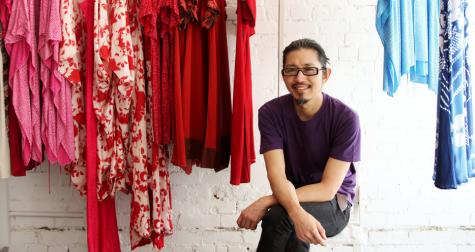The global fashion industry is coming together to highlight the challenges of the fashion supply chain with the inaugural Fashion Revolution Day on Thursday 24th April to commemorate the first anniversary of the Rana Plaza factory collapse in Bangladesh, when 1,133 people were killed and many more injured.
Organisers of Fashion Revolution Day say enough is enough, and they're asking everyone to take part to ask one simple question:
- "Who made your clothes?"
They're encouraging all of us to be curious, find out and do something about it by wearing an item of clothing inside out, photographing it and then sharing it with the hashtag #insideout on all social networks.
That way, people all over the world – designers and icons, high street shops and high couture, cotton farmers and factory workers, campaigners, academics, the media and any individual who cares about what they wear – can come together to demand greater transparency.
Those lending their support to the campaign include fashion icon Akira Isogawa (pictured above), Fashion Revolution Day board member and Oxfam Global Ambassador Livia Firth, author Marion von Adlerstein and 1 Million Women founder Natalie Isaacs.
“The idea for Fashion Revolution Day came to me in the bath,” said Founder of Fashion Revolution and ethical fashion pioneer, Cary Somers.
“I saw that the Rana Plaza disaster could act as a catalyst, with the heightened awareness around ethical fashion providing a window to bring about real change. Fashion RevolutionDay represents an exciting opportunity to reconnect fashion-lovers with the people who made their clothes.”
"Fashion Revolution Day promises to be one of the very few truly global campaigns to emerge this century," says Baroness Young of Hornsey who set up the All-Party Parliamentary Group on Ethics and Sustainability in Fashion in the UK.
“With one simple gesture, #insideout, we want you to ask: 'Who Made Your Clothes?'"
Organisers say this action will encourage people to imagine the ‘thread’ from the garment to the machinist that sewed it and all the way down to the farmer that grew the cotton it was made from.
"We hope that Fashion Revolution Day will initiate a process of discovery, raising awareness of the fact that buying is only the last step in a long journey involving hundreds of people: the invisible workforce behind the clothes we wear," said Cary Somers.
- Find out more at http://www.fashionrevolution.org/.
- Like Fashion Revolution on Facebook at facebook.com/fashionrevolutionday and
- Follow @Fash_Rev_AUSNZ on Twitter.








 Agree (0)
Agree (0) Disagree (
Disagree (











__small.png)










